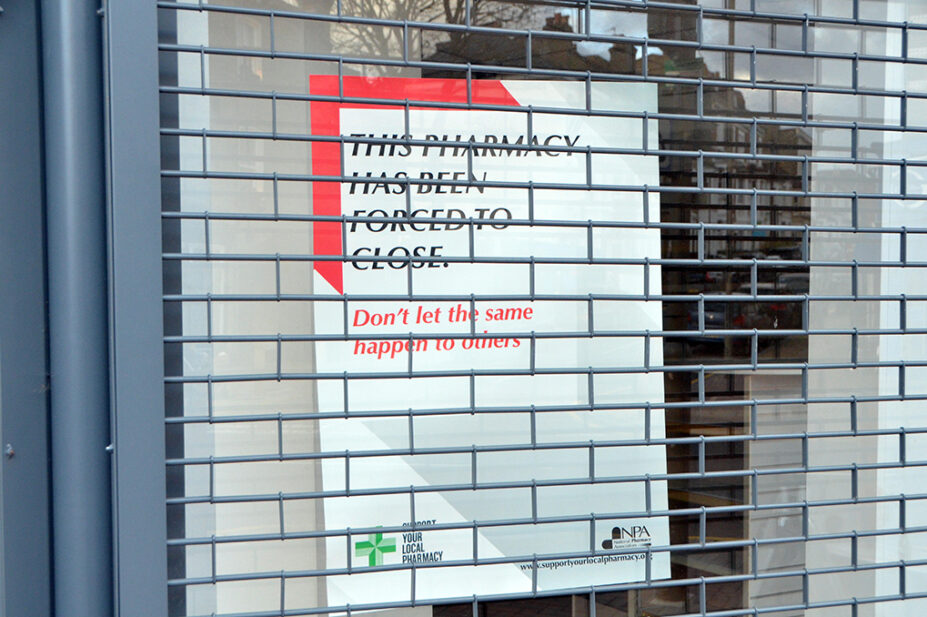
Shakeyjon / Alamy Stock Photo
Community pharmacies in England should be able to permanently reduce their core opening hours by 30% to help contractors manage “unrelenting financial and operational challenges”, the Pharmaceutical Services Negotiating Committee (PSNC) has said.
In a statement published on 14 March 2023, the PSNC set out a range of “regulatory easements” for community pharmacy that it is requesting from the government to reduce “bureaucracy and costs”.
The easements include allowing all pharmacies to “reduce their core opening hours by 30% on a permanent basis”, implementing “closed-door working” for an unlimited number of hours and refusing to dispense prescriptions “where there is no reimbursement for the individual contractor”.
The statement also warned that community pharmacy had “run out of money” to provide existing services and medicines to patients and called for the roll out of new or expanded services, or a Pharmacy Quality Scheme, in financial year 2023/2024 to be paused until additional funding is granted.
In a briefing for contractors, published alongside the statement, the PSNC proposed that pharmacies should be able to amend their core opening hours “to fit business needs (provided that patient needs remain met)”.
“A pharmacy [should] be able to delay dispensing if reimbursement is inadequate: where the reimbursement price of a medicine or medical device, in the drug tariff, or as a concession price, is lower than the purchase price to the contractor,” it added.
The PSNC also recommended replacing the requirement “to supply with reasonable promptness” with “a requirement to supply in a reasonable timeframe”, such as when the reimbursement price from the Department of Health and Social Care (DHSC) is equal to or more than the purchase price.
In September 2022, the PSNC announced it was escalating its concerns to the government about the process for setting price concessions, after contractors reported that medicines could not be purchased at their reimbursement prices.
Janet Morrison, chief executive of the PSNC, said in the PSNC statement: “Many businesses are now operating at a loss, struggling with drug pricing, staffing, increasing public demand and staying open. We are struggling to keep our lights on and urgently need investment.
“We have today told the DHSC and NHS England that they must pause the rollout of new services, including the much anticipated contraception service, and 2023/2024 Pharmacy Quality Scheme.
“This isn’t because we don’t want these services — community pharmacies are incredibly ambitious about the services they could provide to their communities — but because we don’t believe pharmacy owners have the capacity under current conditions to properly undertake this work,” she said.
Tier 1 of the NHS Community Pharmacy Contraception Service, which is aimed to enable pharmacists to supply repeat prescriptions for oral contraception, was originally expected to be rolled out nationally as an advanced service from 11 January 2023, meaning all contractors could register to provide repeat supplies of oral contraception.
However, a statement published on the PSNC’s website on 14 December 2022 said that it would not start on that date, “but it is expected to commence in early 2023”.
The Pharmaceutical Journal revealed in December 2022 that two pharmacies in England have started offering tier 2 of the service, initiating access to oral contraceptives for patients.
“[The] government and the NHS have all the evidence they need to show them that, without urgent action, they, and the public, will lose significant parts of the community pharmacy sector, and soon,” Morrison added.
“This would be catastrophic for pharmacy, patients and for primary care, and we are doing everything within our power to prevent it from happening.”
A spokesperson for the DHSC said that the PSNC jointly agreed in September 2022 to the introduction of the contraception service, referral from urgent and emergency care and the extension of the new medicines service to antidepressants over the following 18 months.
“Community pharmacies play a vital role in supporting the NHS and we back them with £2.6bn a year,” they said.
“We are continuing to discuss with the PSNC how the government can best support community pharmacies and the sector to provide services to patients.”
- This article was amended on 15 March 2023 to include comment from the Department of Health and Social Care


